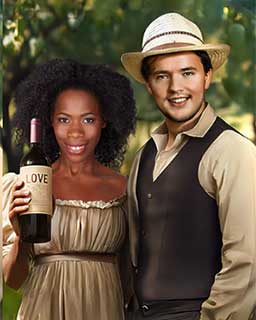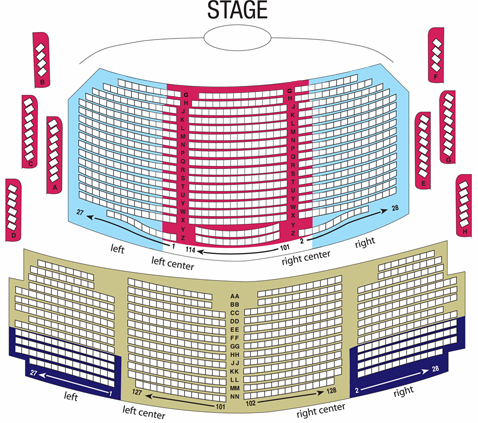
Miami performances are at the Sanford and Dolores Ziff Ballet Opera House at the Adrienne Arsht Center for the Performing Arts of Miami-Dade County, 1300 Biscayne Boulevard, Miami. Click here for information about traffic and parking at the Arsht Center. Click here for directions to the Arsht Center. Fort Lauderdale performances are at the Au-Rene Theater at the Broward Center for the Performing Arts, 201 SW 5th Avenue, Fort Lauderdale. Click here for information about parking at the Broward Center. Click here for directions to the Broward Center. Children must be at least six years old to attend. |
The Elixir of LoveDirected by Matt Cooksey When we first started conceiving the 2024–2025 season, I tried to look for some connective thread between the three main stage operas. Beyond their obvious dissimilarities, the element that stuck out to me was watching what the main characters would do for love. Tamino has his trials in the Temple of Wisdom, and Carmen’s love of freedom is an obvious propellant for the actions in her opera. Yet the path that Nemorino takes to find love is — I believe — one of the most human stories of a character doing whatever it takes for love. Nemorino and the object of his affection, Adina, could not be more different when we first meet them. Adina has a business in town, Nemorino may have never had a serious job. Adina has moments that she is curt, inflexible, and even cruel towards Nemorino, while he is creative, optimistic, and at moments articulate and expressive. The power of the Elixir of Love — just a little wine sold to him by Dulcamara — allows Nemorino to throw away his pitiful, mopey persona and have the confidence he needs to prove his worth to Adina. Adina’s progression in this story is similarly interesting. As we meet her in Act I (“Della crudele Isotta”), she is reading the story of Tristan and Isolde. This classic medieval love story received renewed interest during the Romantic period and would be later adapted in a full operatic treatment by Wagner. The story parallels Adina’s relationship with Nemorino, as she stands in as the unfeeling Isolde with Nemorino as the longing Tristan. If we take her words at the end of each verse as an indication of her deepest desires, though, we know that Adina deeply wishes for a genuine romance. Though her defenses are high for Nemorino, we see them gradually start to break down during Act II, even during her wedding banquet to the pompous Sergeant Belcore. It’s clear to see that Belcore is a pawn in Adina’s game, but that doesn’t make Nemorino any less desperate to find a way to win her heart. The travelling salesman Dulcamara — perhaps one of my favorite comedic characters in opera — knows exactly how to capitalize on Nemorino’s urgency and sells him the key to his future happiness. It’s even more amusing to see Dulcamara promise the moon and the stars to Nemorino, only to be shocked that it all comes true in Act II. What Dulcamara doesn’t know, however, is that Nemorino’s uncle died and left him an incredible inheritance. So while he tells Nemorino that every woman in town would want him, he certainly doesn’t believe his eyes midway through Act II when that literally happens. The music of L’elisir d’amore is a perfect snapshot of the Italian bel canto style, yet it should not go unsaid that the opera could be considered one of the most successful rip-offs in history. The plot is directly pulled from the 1831 French opera called Le philtre by Daniel Auber and librettist Eugène Scribe. Librettist Felice Romani fairly shamelessly adapted the text for Italian audiences, and only added one major sequence to the action in Act II between Adina and Dulcamara near the end. Donizetti worked in his typically lightning-fast compositional process, completing work on the opera in 14 days. However, Donizetti had a unique sense of how his melodies could draw out human emotions of every variety. Donizetti also relied less on the simple verse forms employed by Auber, creating more interesting arias, duets, and ensembles for the principal characters. And Romani’s libretto alternates between tender romance and ridiculous comedy to more bold degrees than the opera by Auber and Scribe. In spite of a quick and slightly unoriginal approach, we are still left with something transcendent, personable, and heart-warming. Sung in Italian with English and Spanish projected translations |
||||||||||||||||||||||||||||||||
|
|||||||||||||||||||||||||||||||||

| SUBSCRIPTIONS | SINGLE TICKETS | CALENDAR | THEATERS & PARKING | ENGLISH / ESPAÑOL |
Ticket Office: (800) 741-1010 · Development Office: (305) 854-1643 · Fax: (305) 856-1042
Having a problem? Click here to send us a message.
Privacy Statement * Donor Privacy Policy
Having a problem? Click here to send us a message.
Privacy Statement * Donor Privacy Policy










































 Processing your request...
Processing your request...




